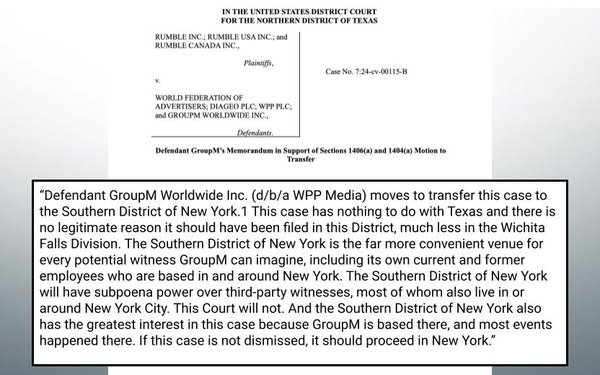
WPP Media, formerly GroupM, has
asked a federal judge to transfer Rumble's ad boycott lawsuit from Wichita Falls, Texas to New York City.
"This case has nothing to do with Texas and there is no legitimate
reason it should have been filed in this District, much less in the Wichita Falls Division," the agency argues in papers filed Tuesday with U.S. District Court Judge Jane Boyle in the Northern
District of Texas.
WPP Media adds that the Southern District of New York in Manhattan is "the far more convenient venue for every potential witness GroupM can imagine,
including its own current and former employees who are based in and around New York."
The motion comes in Rumble's lawsuit accusing the World Federation of Advertisers, WPP,
GroupM and spirits marketer Diageo of violating antitrust law by allegedly scheming to deprive the video platform of ad revenue. Rumble brought the case the same day Elon Musk's X Corp. sued the World Federation of Advertisers, its now defunct brand safety initiative Global Alliance for Responsible Media (GARM),
and advertisers over an alleged advertiser boycott.
advertisement
advertisement
The World Federation of Advertisers, WPP Media and others previously argued to Boyle that Rumble's lawsuit should be
dismissed before trial.
WPP Media is still asking Boyle to throw out the case, but also says that if she declines to do so, the matter should be heard in New York.
"Any witness from GroupM will benefit from testifying in New York rather than having to travel to Texas because no one at GroupM with personal knowledge of Rumble’s allegations
is in this district," the agency writes.
The agency adds that transferring the case to New York "will require less travel for any witnesses from Rumble" given that Rumble is
headquartered in Florida and Ontario.
Earlier this month, the World Federation of Advertisers and advertisers also asked Boyle to transfer Musk's suit to New York City.
Both lawsuits came soon after the Republican-led House
Judiciary Committee accused GARM of coordinating action by
corporations, ad agencies and other industry groups in order to “demonetize platforms, podcasts, news outlets, and other content deemed disfavored by GARM and its members.”
Rumble alleged in its complaint that GARM, GroupM and others “agreed not to place client advertisements on platforms like Rumble that do not adopt GARM’s one-size-fits-all
brand safety standards.”
The company added that it does not “implement policies based on GARM’s preferred brand safety standards,” but instead
“offers advertisers flexibility to choose the types of content and individual content creators that their advertisements appear alongside.”
The World Federation of
Advertisers, GroupM and others countered in their motion to dismiss the lawsuit that Rumble failed to plausibly allege "an agreement, a relevant market, or a harm to competition."
“Rumble's claims are instead an attempt to force defendants to do business with Rumble despite many competitive reasons not to do so,” they argued in a written motion
that's currently pending with Boyle.
“Rumble should not be allowed to weaponize the antitrust laws to create that business relationship and force advertisers to speak on its platform
(notwithstanding their First Amendment rights)," they added.
The World Federation of Advertisers and others also argued that GARM's brand safety framework "merely identifies
content that is inappropriate for advertising support (like child pornography, illegal activity, terrorism, etc.),” and "does not identify Rumble (or any other platform) as inappropriate for
advertising or any brand-safety measures as being required.”
A spokesperson for the World Federation of Advertisers said last year that allegations that GARM engaged in
anti-competitive behavior are baseless.
“GARM creates voluntary industry standards on brand safety and suitability which media sellers and ad tech companies can
voluntarily adopt, adapt or reject,” the spokesperson said. “This in turn allows advertisers to make choices similar to the way they buy advertising in TV, print or radio. GARM’s
work focuses on voluntary monetization standards while establishing voluntary steps to improve transparency on content moderation and platform design.”